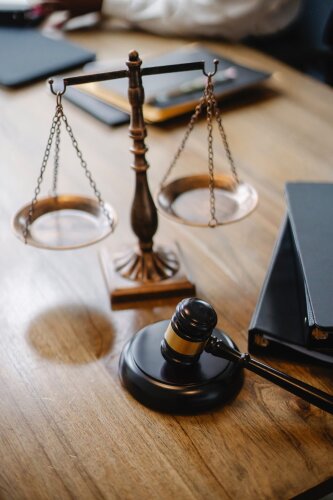Best Art & Cultural Property Law Lawyers in Uyo
Share your needs with us, get contacted by law firms.
Free. Takes 2 min.
List of the best lawyers in Uyo, Nigeria
About Art & Cultural Property Law in Uyo, Nigeria
Art & Cultural Property Law in Uyo, Nigeria, is a specialized area of law that addresses the protection, regulation, and preservation of cultural heritage and artistic expressions. This field of law is vital in Uyo due to its rich cultural history and diverse artistic traditions. The law encompasses issues related to ownership, sale, and export of art and cultural artifacts, as well as measures against the illicit trade and misappropriation of cultural properties. By respecting cultural heritage, Art & Cultural Property Law aims to maintain and promote the cultural identity and legacy of the region.
Why You May Need a Lawyer
There are numerous situations where individuals and organizations may require legal assistance in Art & Cultural Property Law. Common scenarios include disputes over the ownership of cultural artifacts, cases involving the destruction or vandalism of cultural sites, and legal proceedings concerning the unauthorized reproduction of artistic works. You may also need a lawyer if you are involved in the sale or purchase of art pieces or cultural items, to ensure compliance with local and international laws governing such transactions. Legal guidance is also crucial when exporting or importing cultural property to prevent the breach of regulations.
Local Laws Overview
The legal framework governing Art & Cultural Property Law in Uyo, Nigeria, includes a combination of federal regulations and customary practices. Key aspects include the National Commission for Museums and Monuments Act, which provides for the protection and documentation of monuments and antiquities across the country. Additionally, the Nigerian Copyright Act protects intellectual property rights related to artistic works. Local customs in Uyo may also play a critical role in cultural property cases, highlighting the importance of understanding both statutory and traditional forms of legal governance.
Frequently Asked Questions
What is considered cultural property?
Cultural property includes artifacts, artworks, monuments, and any object of historical, artistic, or cultural significance that represents the cultural identity of a group or society.
Who owns cultural property in Nigeria?
Typically, cultural property may be owned by individuals, families, communities, museums, or governmental bodies. Ownership depends on the nature of the property and applicable legal statutes.
Can cultural property be sold or transferred?
Yes, but such transactions must adhere to national and international regulations to prevent illegal trafficking and ensure the legitimate provenance of the items.
How does Nigeria protect its cultural heritage?
Nigeria protects its cultural heritage through legislation like the National Commission for Museums and Monuments Act and by enforcing penalties against illegal trading and export of cultural artifacts.
What are the consequences of violating cultural property laws?
Consequences may include fines, imprisonment, restitution of the property, and a ban on future transactions involving cultural items.
How do I report suspected illegal activity involving cultural property?
You can report to the National Commission for Museums and Monuments or local law enforcement authorities who handle such offenses.
Can artistic works be protected under copyright law?
Yes, artistic works are protected under the Nigerian Copyright Act, which grants creators exclusive rights to reproduce, distribute, and display their works.
Is there a regulatory body for cultural property in Nigeria?
Yes, the National Commission for Museums and Monuments is responsible for the preservation and protection of Nigeria’s cultural heritage.
What is the role of traditional leaders in cultural property issues?
Traditional leaders may play a role in mediating disputes and providing customary insights into cultural property matters, especially within local communities.
Are there international laws that protect cultural property?
Yes, international conventions like the UNESCO Convention prohibit the illicit import, export, and transfer of ownership of cultural property.
Additional Resources
Some helpful resources and organizations include the National Commission for Museums and Monuments, the Nigerian Copyright Commission, and academic institutions with cultural heritage programs. These bodies offer guidance, regulation, and protection frameworks for arts and cultural properties.
Next Steps
If you require legal assistance in Art & Cultural Property Law, consider consulting a lawyer specializing in this field. Start by gathering all relevant documentation and information related to your issue. You may contact local bar associations in Uyo for referrals to qualified attorneys or engage with governmental bodies that handle cultural property concerns. Addressing these matters promptly and with professional help increases the likelihood of a favorable resolution.
Lawzana helps you find the best lawyers and law firms in Uyo through a curated and pre-screened list of qualified legal professionals. Our platform offers rankings and detailed profiles of attorneys and law firms, allowing you to compare based on practice areas, including Art & Cultural Property Law, experience, and client feedback.
Each profile includes a description of the firm's areas of practice, client reviews, team members and partners, year of establishment, spoken languages, office locations, contact information, social media presence, and any published articles or resources. Most firms on our platform speak English and are experienced in both local and international legal matters.
Get a quote from top-rated law firms in Uyo, Nigeria — quickly, securely, and without unnecessary hassle.
Disclaimer:
The information provided on this page is for general informational purposes only and does not constitute legal advice. While we strive to ensure the accuracy and relevance of the content, legal information may change over time, and interpretations of the law can vary. You should always consult with a qualified legal professional for advice specific to your situation.
We disclaim all liability for actions taken or not taken based on the content of this page. If you believe any information is incorrect or outdated, please contact us, and we will review and update it where appropriate.








